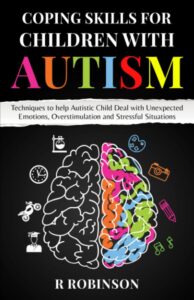Resilience is an essential ability in our lives. It means we can bounce back when situations or life doesn’t go our way. Let’s face it, we must go to Plan B, C, D, etc. a lot more than our Plan A happens in our lives. That is why it’s so important that our autistic/ADHD children and teens increase their resilience, which can be harder for them since they are more inflexible when it comes to change and dealing with adversity. So how can you as a parent, caregiver or teacher help your autistic child improve their resilience?
What is resilience?
The Merriam-Webster Dictionary defines resilience as “an ability to recover from or adjust easily to adversity or change.”
The American Psychological Association defines it as “the process and outcome of successfully adapting to difficult or challenging life experiences, especially through mental, emotional, and behavioral flexibility and adjustment to external and internal demands.”
In other words, it’s the ability to get back up and keep going when you’ve fallen down or have had a major change in life. It happens to all of us throughout our lives, and it’s an essential skill that helps to keep our mental health and well-being stable.
Autism and resiliency

Children and teens with autism can have a difficult time with resiliency. That is because they tend to be more inflexible when it comes to routines, thinking and behaviors. They have a harder time dealing with adversity, changes in routine and generally things not going their way. This is referred to as cognitive inflexibility or rigidity.
Yet, our autistic children have to face tough situations and change a lot throughout their childhood and teen years – both at home and school. They are at higher risk of bullying. Academics are more difficult for many of our autistic kids. They face social and communication challenges. Changes to routines can be especially stressful for them. If they are masking, that can lead to autistic burnout.
I’ve seen this with my son J. All of these have applied to him throughout his life. Slowly, he has improved his resilience, but it has been a tough road for him at times. As a parent, I’ve stuck with him and helped him through these difficult situations. I have emphasized the importance of learning from mistakes and that making them doesn’t mean failure. I’ve helped him learn coping skills for stressful situations. Reminding him to ask for help has been a key to him getting through hard times too. For many circumstances, he has come out stronger on the other side, even if it took a while to get there.
Positive effects of resiliency
Building resilience can help your autistic child or teen in so many ways. Resilience can help:
- Increase confidence and self-esteem
- Reduce anxiety and stress
- Gain independence
- Develop new skills
- Learn the importance of emotional boundary setting
- Realize a sense of belonging in the world
- Overcome challenges and learn from mistakes
How to help your autistic child improve their resiliency
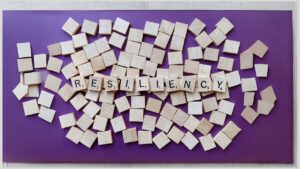
So as a parent, caregiver or teacher, what can you do to help increase resilience in your autistic child or teen? Here are some ways to help them.
1. Encourage them to ask for help when it’s needed, especially when learning something new
This is a big one. I know I can be stubborn about not asking for help, so it’s been a learning for me to emphasize this to my son J. Yet, it can be one of the most helpful and valuable ways to improve resilience.
2. Teach coping skills for dealing with stressful situations
Our kids are going to have stressful times, just like we do. They can learn coping skills to get them through these tough situations and grow from them. It’s key as parents to help them identify the best skills for them to develop, so they can more easily handle these situations and get through them.
3. Help them stick it out when going through a challenge or developing a new skill
None of us are good at doing something new. My son J always expected to be able to do a new skill or task perfectly and wanted to give up if he couldn’t. I encouraged him to stick with it and keep going to learn how to do it better. Most of the time, he ended up getting better at a skill or task and was glad he kept at it.
4. Emphasize that they won’t always get things right and the importance of learning from mistakes
I reminded my son J that everyone makes mistakes. It’s a fact of life. It doesn’t mean you are a failure. Instead, learning from mistakes is a way that we grow as a person and while learning a new skill or task. My younger son said to me the other day, “Mom, I like how you usually don’t make the same mistake twice.” Well, maybe and maybe not – it depends on the mistake! I try not to make them twice or even more, but sometimes it’s part of the journey. 😊
5. Urge them to seek support from family, friends and/or other trusted people like therapists when going through difficult circumstances
It’s so important to lean on others for support during difficult circumstances. I’ve learned this over and over during my life, and I hope I’ve modeled that for J and his brother. I am very independent, but when I am going through a rough time, I need support from my mom, friends, family and neighbors. Last year was a good example while I was going through divorce and then some big home repair situations where my neighbors stepped in to help me through it.
I have talked to J about that and encouraged him to reach out to me, his dad, his brother, his friends online and definitely his therapist when he needs support. He has gotten better at this over the past few years, and I’m always proud of him when he self-advocates for it.
6. Help them learn emotionally healthy responses to hard situations
Not every day is going to feel like rainbows and sunshine, and it’s okay to feel frustrated, sad, irritable, anger and other emotions when going through a difficult situation. What I’ve hopefully taught my son J is that it’s important to deal with them in an emotionally healthy way. It’s been a rocky road during different periods, but as a young adult, I think he handles his emotions better now than he has in the past.
7. Encourage them to build self-advocacy skills
One of the best life skills your autistic child or teen can build is self-advocacy, and it is a key to improving resilience. I’ve watched get better at self-advocacy throughout his childhood, teen years and now as a young adult. It has been one of the best things he has done to boost his self-confidence and speak up for what he needs and wants.
8. Teach them how to set healthy boundaries with others
Part of resilience is being able to set and enforce boundaries with others. It’s not an easy thing to learn at any age but helping your autistic child or teen achieve this will improve their resiliency.
9. Guide them in building a strong sense of self
Having a strong sense of self can really help your autistic child or teen bounce back when things don’t go their way. They will know who they are and can have confidence and comfort in that as they work their way through the difficulty.
10. Help your child improve their communication and social skills
Autistics have challenges with both communications and social skills, however, improving both not only helps with resilience but in many other ways for their life as well.
What other suggestions do you have to help an autistic child or teen improve their resilience? Leave a comment below so that we can share and encourage each other along this journey.
Additional resources
Want to look deeper into this topic? Here are some resources available.
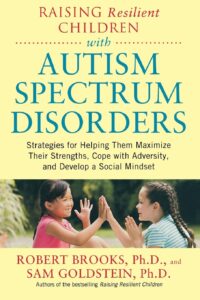
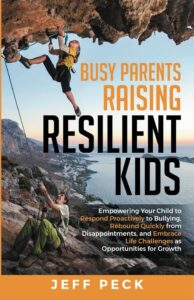
Raising Resilient Children: Fostering Strength, Hope, and Optimism in Your Child (affiliate link)
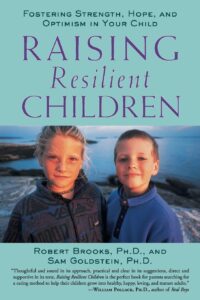

COPING SKILLS FOR CHILDREN WITH AUTISM: Techniques to help Autistic Child Deal with Unexpected Emotions, Overstimulation and Stressful Situations (affiliate link)
